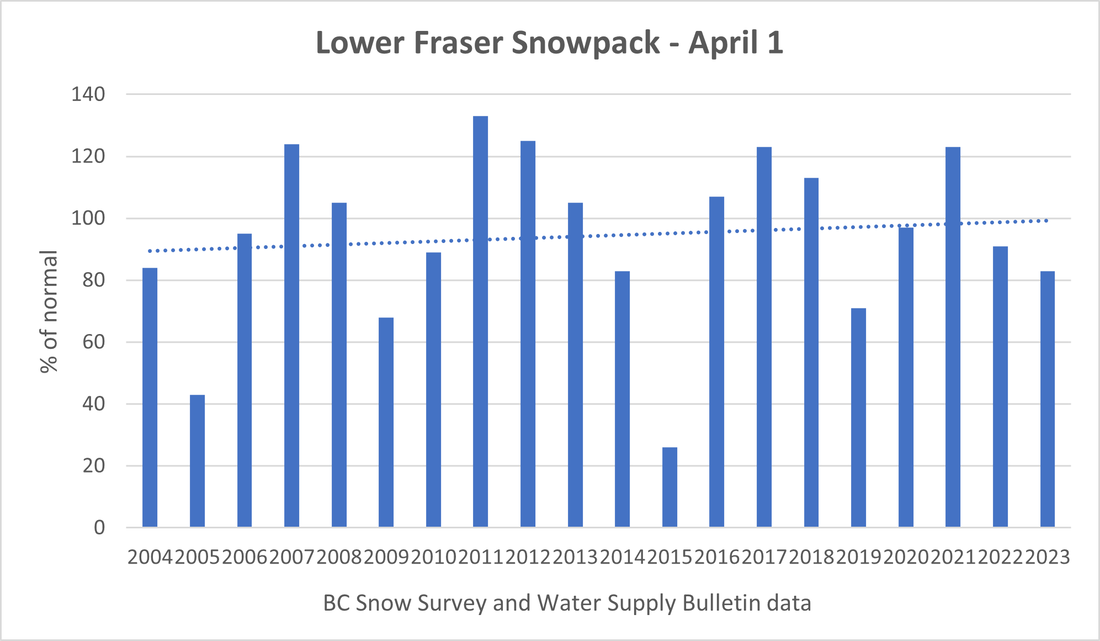|
A recent, unnecessary, story in the Vancouver Sun was titled Metro Vancouver needs more than conservation to solve future water needs. Referring to 2022 water restrictions: … last year, that ban had to be extended to Nov. 1 when the region’s reservoirs were at or near their lowest levels. The articles's link to the Metro Vancouver Reservoir Levels & Water Use graph shows that, while lower than average, available water last October was still in the “Normal Range”, with the inevitable rains of November on the horizon. The reporter’s wording that supply was at or near their lowest levels, is alarmist exaggeration. The real purpose of the opinion piece is fear mongering. We are shown two pictures of an apparently receding Coquitlam Glacier with the portentous lead-in: Crunch time may finally have arrived. This before-and-after scare tactic is the BC equivalent of the classic polar bear on an ice flow. Not only is the glacier insignificant to Vancouver’s water supply, the comparison between purported 2006 ice abundance before, and 2021 (not 2022 as reported) ice diminishment after, isn’t particularly impressive. The after picture was taken from a greater distance so the glacier appears smaller, and in the before picture the glacier appears larger due to unadhered snow in a basin at the toe of the actual solidified ice field. Most important, the validity of the comparison is questionable as there is no time-of-year information for the before photo, which may have been taken earlier in the melt season than the October after shot. The reporter’s opinion includes an expectation of future snow decrease: Climate models also predict a general reduction in snowpack accumulation which will reduce late-season water storage levels and increase wildfire risk at higher elevations. Yet for the 2 decade period under discussion since Metro Vancouver has been implementing conservation measures (now inadequate in the reporter’s view), snowpack has actually been trending upward: The climate models referred to by the reporter that would support a water supply crisis, are based on an unrealistic future. All government levels in BC promote climate emergency based on Representative Concentration Pathway 8.5 (RCP8.5) which is one of several predictions about future CO2 emissions. However, RCP8.5 is a worst-case-scenario, not business-as-usual as it has come to be tagged. Esteemed climate scientist Zeke Hausfather (who is not a climate change skeptic) explained in a January 2020 Nature article:
… the world imagined in RCP8.5 is one that, in our view, becomes increasingly implausible with every passing year. Emission pathways to get to RCP8.5 generally require an unprecedented fivefold increase in coal use by the end of the century, an amount larger than some estimates of recoverable coal reserves. Our climate change policies are all based on extreme modelling outcomes that rely on RCP8.5 impossibilities. As part of the litany of wet/dry/hot/cold weather events the reporter confusingly uses to prove climate change disaster, she of course highlights: There was the unprecedented heat dome in June 2021 — described in the water district’s March Climate Impacts Report as “the most anomalous regional extreme heat events to occur anywhere in the world.” The most anomalous in the world … wow! But she left out that the water district’s quote actually said, “one of the most anomalous …” (emphasis added). The quotation omission demonstrates some obviously deceptive hyperbole, and a few days of heat does not create drastic reductions to reservoir levels. If there are shortages in the future it will be due to population pressure, not a lack of precipitation/snowpack. Contrary to the doom and gloom message, there isn’t a water supply problem in the Vancouver region. There is a media credibility problem though, involving a Sun reporter who appears to be experiencing a very dry period for climate-angst news.
0 Comments
Leave a Reply. |
Hot Topics
Aboriginal Title Almost Record Heat Atmospheric Rivers Attribution Simulation Carbon Capture Child Litigation Climate Shift Index CO2 Offset Leakage Coastal Flood Risk Democracy Lost Drought Exaggeration Eco-Negativity Eco-Politics ESC Investment Evolution Excess Hydro Expert Hypocrisy Extreme Heatwaves Fake Hype Geo-Engineering Government Bias Heat Waves Hottest Month Ever Hottest Year Ever Housing Crisis Hyperthermia Ice Roads Indigenous Conservation Indoctrination Kelp Farms Landslides Media Bias Mental Illness Misplaced Reconcilliation Misleading Data National Discord Natural Gas Net-Zero Future Outside Play Park Take-Over Political Deception Public Safety Impasse Sea Level Ruse Socialist Agenda Solar Panels Species Not At Risk Statistical Dishonesty Sue Big Oil Temperature Trickery Treaty Infringment Tsunami Refuge Unmarked Burials Unprecedented Drought Urban Heat Island Very Hot Days Warming Causes Cold Water Supply White Dislike Wildfire Wildlife Death Woke Plans Worsening Storms |



